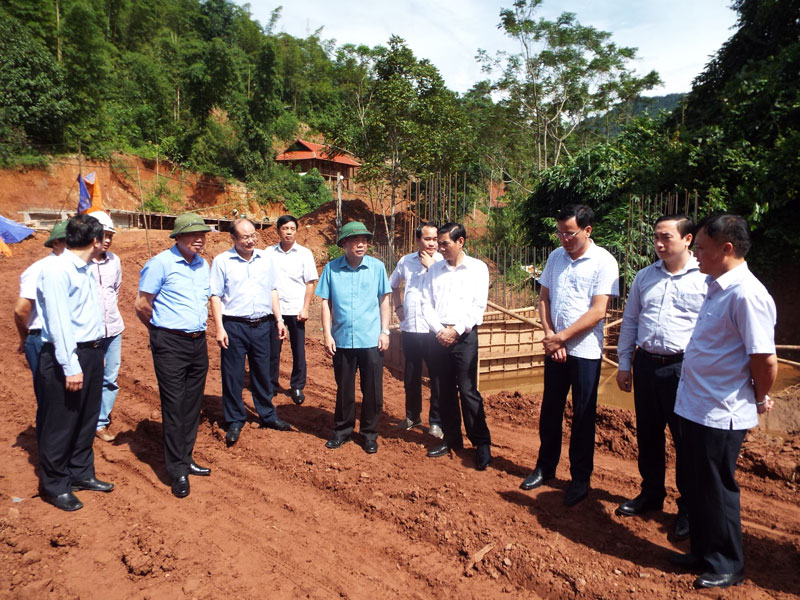
(HBO) – In the morning of August 21, Vice Secretary of the Hoa Binh Party Committee and Chairman of the provincial People’s Committee Nguyen Van Quang inspected the building of the Cun Pheo - Hang Kia - National High Way No.6 road.

Chairman of the provincial
People’s Committee Nguyen Van Quang examines the project.
The construction of the route began in October 2016 at a total
cost of 80 billion VND. Funding for the project is sourced from the national
budget earmarked for a programme on supporting local socio-economic development.
The project has to date completed its subgrade, with investment
and spending amounting to 25 billion VND. Due to capital difficulty, the main
investor – the Mai Chau district People’s Committee – asked relevant agencies
to reschedule the project into two phases.
Accordingly, the first phase is set to disburse a budget of 54
billion VND until 2020 to build a drainage system as well as different base levels
for the formation of a concrete surface. The second phase, with a funding worth
26 billion VND, completes the remaining subgrade of the road.
The construction of the road has encountered downpours, which caused
landslides and hindered traffic flow. The Mai Chau district People’s Committee
proposed the provincial authorities channel more capital into the project so
that the road will soon be fully operational.
Checking on the construction progress of the project and taking
note of proposals by the committee, Chairman of the provincial People’s
Committee Nguyen Van Quang directed relevant units to consider injecting an
addition of 26 billion VND into the project. The Mai Chau People’s Committee
was tasked with joining relevant agencies to direct the allocation of human
resources and equipment following regulations.
Hoa Binh province is undergoing a dynamic transformation amid Vietnam’s national digital transition. Building on Poliburo’s Resolution No. 57-NQ/TW on breakthroughs in science, technology, innovation, and national digital transformation, the province has rolled out a wide range of practical action plans. A standout initiative is the "Digital Literacy for All” movement, an effort to ensure that no one is left behind in the digital era.
Hoa Binh province is undergoing a dynamic transformation in the wake of the national digital transformation movement. Building on Resolution No. 57-NQ/TW of the Politburo on breakthroughs in science, technology, innovation, and national digital transformation, the province has implemented a wide range of practical action plans. A standout initiative is the "Digital Literacy for All” movement ambitious effort to ensure that no one is left behind in the digital age.
With a spirit of unity and proactive problem-solving, the Party Committee, the government and the people of Dong Lai Commune (Tan Lac District) have made great strides in implementing the resolutions of the 24th Party Congress of the commune for the 2020 - 2025 term. Focusing on leadership and practical actions, the commune has brought the Party’s resolutions into daily life, creating strong impacts and pushing the local development forward.
Amid the nationwide push for digital transformation, young people in Hoa Binh Province are stepping up as dynamic pioneers, applying technology to enhance Youth Union operations and expand the reach of youth-led initiatives. Through creativity and adaptability, Youth Union organizations at all levels have introduced a series of practical solutions, contributing to modern governance and community development.
In recent years, An Nghia commune, located in Lac Son district, has stepped up administrative reform, focusing on improving the quality and efficiency of its single-window service unit for receiving and processing administrative procedures. These improvements have helped create favourable conditions for local residents and organisations to handle administrative procedures, contributing to the commune’s broader socio-economic development.
The Prime Minister-approved master plan to develop the multi-use value of forests ecosystems through 2030, with a vision to 2050, aims to improve the management and sustainable use of forest resources, create jobs, increase incomes, and improve the living standards of ethnic minorities, people in mountainous and remote areas, forest workers and those living near forests.



